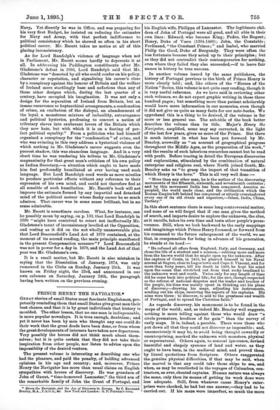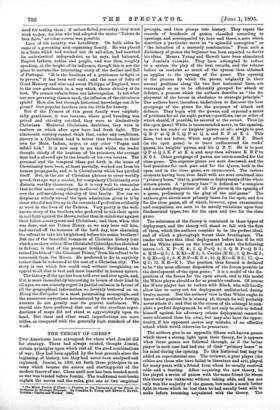PRINCE HENRY THE NAVIGATOR.* GREAT stories of small States must
fascinate Englishmen, per- petually reminding them that small States give great men their best chance, and that it is by great individuals that history is moulded. The other lesson, that no one man is indispensable, is more popular nowadays. It is true enough, doubtless ; and yet it never has been by men who thought any one could do their work that the great deeds have been done, or from whom the great developments of interests have taken new departures. Very possibly the heroes did not think much about them- selves ; but it is quite certain that they did not take their inspiration from other people, nor listen to advice upon the impossiblity of the desired venture.
The present volume is interesting as describing one who had the pleasure, and paid the penalty, of holding advanced opinions in his age and country ; and, moreover, Prince Henry the Navigator has more than usual claims on English sympathies with heroes of discovery. He was grandson of John of Gaunt, "time-honoured Lancaster," the third son of the remarkable family of John the Great of Portugal, and
• Heart, the Navigator, and the Me of Discovery is Europe. By 0 Raymond Bearley, M.A , F.R.G.S., &c. New York and London: G. P. Putnam', none.
his English wife, Philippa of Lancaster. The legitimate chil. dren of John of Portugal were all good, and all able in their own lines : Edward, who became Bing ; Pedro, the Regent; Henry, Duke of Yiseu (1394-1460); John, the Constable ; Ferdinand, " the Constant Prince ; " and Isabel, who married Philip the Good, Duke of Burgundy. They were often the less fortunate because they acted up to their principles ; but as they did not contradict their contemporaries for nothing, even where they failed they also succeeded,—if to leave fair names in history be true success.
In another volume issued by the same publishers, the history of Portugal previous to the birth of Prince Henry is more clearly told ; and, like others of the " Heroes of the Nation " Series, this volume is not quite easy reading, though it is very useful reference. As we have said in reviewing other such volumes, we do not expect graphic writing in these three hundred pages ; but something more than patient scholarship would leave more information in our memories, even though it did not give us quite as many facts for our note-books. We apprehend this is a thing to be desired, if the volume is for more or less general use. The sub-title of the book better describes the volume than its title. Major's Henry the Navigator, amplified, some may say corrected, in the light of the last few years, gives us more of the Prince. But there is much interest in what has been put forward by Mr.
Beazley, avowedly as " an account of geographical progress throughout the Middle Ages, as the preparation of his work," and the results of such laborious researches cannot but be read with profit. Before tracing in detail the European discoveries and explorations, stimulated by the combination of natural enterprise and religious zeal, where North joined South, Mr. Beazley asks us "to grasp the import of that transition of
which Henry is the hero." This is all very well done:— "More than any other man, he is the author of the discovering movements of the fifteenth, sixteenth, and seventeenth centuries ; and by this movement India has been conquered, America re- peopled, the world made clear, and the civilisation which the Roman Empire left behind has conquered or utterly overshadowed every one of its old rivals and superiors,—Islam, India, China, Tartary."
In this short sentence there is some long controversial matter, and none of ne will forget that if one man gives the method of search, and imparts desire to explore the unknown, the clue, as it unrolls, takes its own time and tests other people's perse- verance. Still, when we look backward to the early mappings and imaginings which Prince Henry focussed, or forward from his command to the future enlargement of the world, we see that, in compensation for being in advance of his generation, he stands at its head :—
" He refused all offers from England. Italy, and Germany, and chose the life of a student and a seaman,—retiring more and more from the known world that he might open up the unknown. After the capture of Ceuta, in 1415, he planted himself in his Naval arsenal at Sagres, close to Lagos town and Cape S. Vincent, and for more than forty years, till his death in 1460, he kept his mind upon the ocean that stretched out from that rocky headland to the unknown west and south. Twice only for any length of time did he come back into political life ; for the rest, though respected as the referee of national disputes and the leader and teacher of the people, his time was mainly spent in thinking our his plans of discovery—drawing his maps, adjusting his instruments, sending out his ships, receiving the reports of his captains. His aims were three : to discover, to add to the greatness and wealth of Portugal, and to spread the Christian faith."
As regards discovery, his monument is to be found in the maps of the world; and, as indeed Mr. Beazley well suggests,
nothing is more telling against those who would draw "a circle premature, heedless of far gain" than the survey of early maps. It is, indeed, a parable. There were those who put down all that they could not discover as impossible ; and, unconsciously it may be, to avoid being thought cowardly or
unenterprising, marked the unknown with monsters, physical or supernatural. Others again, to conceal ignorance, devised beautiful and shapely systems of land and water, as they ought to have been, in the mediaeval mind, and proved them by literal quotations from Scripture. Others exaggerated the genuine physical difficulties, if that may be said, when the marvel is that any could take those ships to sea, and when, as may be recollected in the voyages of Columbus, con-
tractors, as ever, cheated captains. Human nature was always the same, only then its means of getting its work done were less adequate. Still, from whatever cause Henry's enter- prises were checked, he had but one answer,—they had to be carried out. If his mans were imperfect, so much the more
need for testing them ; if sailors failed yesterday, they must work to-day : for him who had adopted the motto " Talent de bien faire," no other course was possible.
Love of his country was hereditary. On both sides he came of a governing and organising family. He was placed in a State which had worked out its salvation, had asserted its ecclesiastical independence, as he says, had balanced, English fashion, nobles and people, and was then, roughly speaking, at the height of its influence, though this is not the place to narrate the interesting story of the decline and fall of Portugal. "It is the business of a gentleman to fight or to govern," it has been well said ; and the sons of John of Good Memory and wise and sweet Philippa of England, were to the core gentlemen in a way which shows chivalry at its best. We cannot refrain from one interrogation. Is not what our new governing classes need, the infusion of the chivalrous spirit ? How else but through historical knowledge can it be given ? Our popular teachers care too little for history.
But if the Princes of this great family were emphati- cally gentlemen, it was because, where good breeding was prized and chivalry extolled, they were so distinctively Christians. Medimval Christians, doubtless, they were in matters on which after ages have had fresh light. The nineteenth century cannot think that, under any conditions, slavery in a Christian land is better than freedom in their own for Moor, Indian, negro, or any other Pagan and infidel folk." It is now easy to see that whilst the leader thought chiefly of the baptism of his prisoners, the average man had a shrewd eye to the benefit of his own estates. The personal and the temporal ideas put forth in the name of Christianity have been, at least partially, worked out from its human propaganda, and it is Christianity which has purified itself. But, in the use of Christian phrases to cover worldly greed, that age was a master, for compulsory Christianity ever distorts worldly characters. So it is very well to remember that to this same compulsory medimval Christianity we also owe the self-sacrificing chivalry of that family. Nor can we despise as utterly unreal the open admiration given to it by those who did not live up to the counsels of perfection evidently at work in the lives of the Princes. Very pretty is the well- known story of the brothers who preferred to win their spurs in real fight against the Moors, rather than in mimicwar against their fellow-countrymen and Christians; and then, when this was done, and our Prince Henry, as we may here call him, had carried off the honours of the hard day, how charming the refusal to take his knighthood before his senior brothers ! But one of the beautiful romances of Christian history (one which a modern writer, Miss Christabel Coleridge, has sketched in fiction), is that of the younger brother, Ferdinand, who earned his title of " the Constant Prince," from his refusal to be ransomed from the Moors. He preferred to die in captivity rather than be redeemed at the cost of a Christian city. The story is one which few could read without recognising an appeal to all that is best and most beautiful in human nature.
The history of the age has been told over and over again, and, if it is more immediately interesting to lovers of their kind in all ages, we can scarcely regret its partial omission in favour of all the geographical information so lavishly bestowed on us. Henry the Navigator is a most painstaking monograph, and the numerous corrections necessitated by its author's foreign absence do not greatly mar its general usefulness. We should also have preferred that one of the excellent repro- ductions of maps did not stand so aggravatingly upon its head. But these and other small imperfections are mere trifles, as compared with the generally high standard of the work.







































 Previous page
Previous page